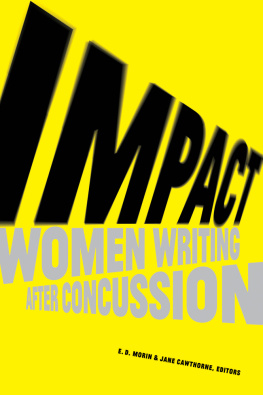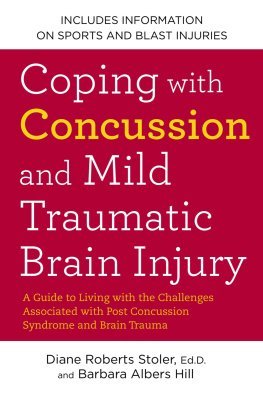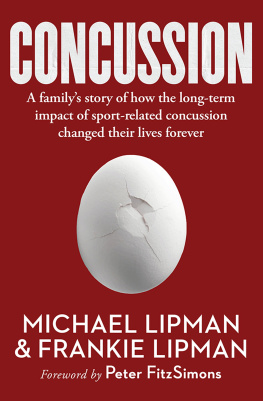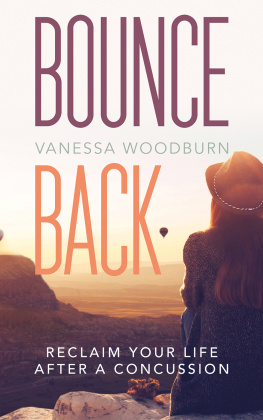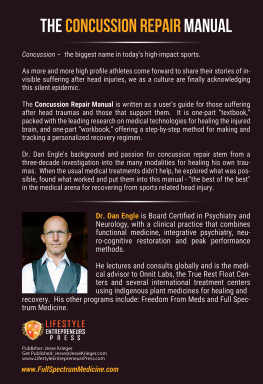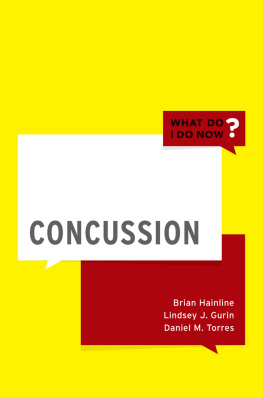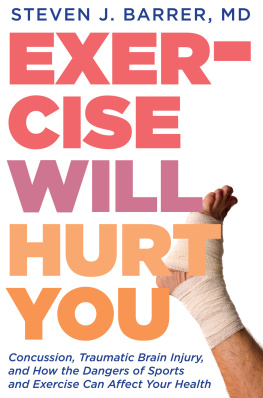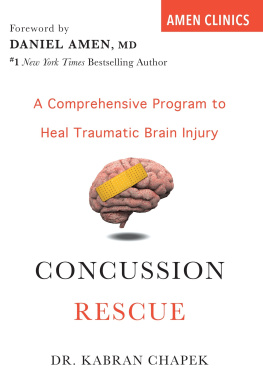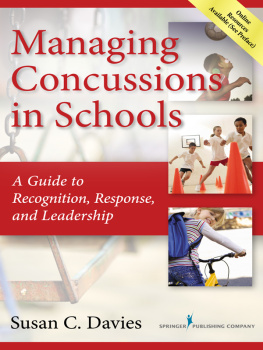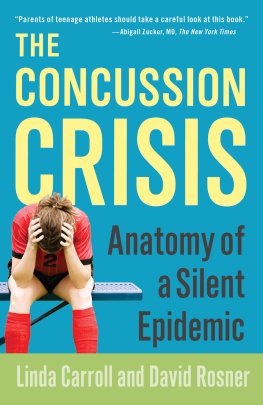

Published by
University of Alberta Press
116 Rutherford Library South
11204 89 Avenue NW
Edmonton, Alberta, Canada T6G 2J4
Amiskwacwskahican | Treaty 6 | Mtis Territory
uap.ualberta.ca
Copyright 2021 University of Alberta Press
LIBRARY AND ARCHIVES CANADA CATALOGUING IN PUBLICATION
Title: Impact : women writing after concussion / E. D. Morin and Jane Cawthorne, editors.
Other titles: Impact (2021)
Names: Morin, E. D. (Elaine D.), 1964 editor. | Cawthorne, Jane, editor.
Description: Includes bibliographical references.
Identifiers: Canadiana (print) 2021024979X | Canadiana (ebook) 20210249846 | ISBN 9781772125818 (softcover) | ISBN 9781772125863 (EPUB) | ISBN 9781772125870 (PDF)
Subjects: LCSH: BrainConcussionPatients. | LCSH: Women authorsMental health. | LCSH: Post-concussion syndrome. | LCSH: Healing. | LCSH: Grief.
Classification: LCC RC394.C7 I47 2021 | DDC 617.4/81044dc23
First edition, rst printing, 2021.
First electronic edition, 2021.
Digital conversion by Transforma Pvt. Ltd.
Copyediting by Kimmy Beach.
Proofreading by Maya Fowler Sutherland.
Cover design by Alan Brownoff.
All rights reserved. No part of this publication may be reproduced, stored in a retrieval system, or transmitted in any form or by any means (electronic, mechanical, photocopying, recording, or otherwise) without prior written consent. Contact University of Alberta Press for further details.
University of Alberta Press supports copyright. Copyright fuels creativity, encourages diverse voices, promotes free speech, and creates a vibrant culture. Thank you for buying an authorized edition of this book and for complying with the copyright laws by not reproducing, scanning, or distributing any part of it in any form without permission. You are supporting writers and allowing University of Alberta Press to continue to publish books for every reader.
University of Alberta Press gratefully acknowledges the support received for its publishing program from the Government of Canada, the Canada Council for the Arts, and the Government of Alberta through the Alberta Media Fund.

Sooner or later, everyone is a wounded storyteller.
ARTHUR W. FRANK
Contents
Brainstorm
how we got here
E. D. MORIN & JANE CAWTHORNE
THE EDITORS OF THIS ANTHOLOGY have a shared history. We met more than twenty years ago when our children attended school together, and we have been friends ever since. For many years, we were also neighbours and occasionally dropped in on each other unannounced. The kettle would go on and tea would be poured and an hour or two could fly by.
Jane remembers one unusual occasion when she stopped by Elaines house. She remembers Elaines strange reaction when she opened the door, as though she was trying to hide behind it. Jane didnt know what to make of this, but her impression was that it was not a good time for a visit. As time went on, Elaine remained out of sight. Months later, Jane learned that Elaine had injured her head. Was it the brightness of the day that made Elaine wince as she opened the door? Was it the very idea of holding a conversation? Light and sound sensitivity often leave those with concussions shrinking from social contact.
Back then, Jane hardly knew what having a concussion meant. A few years later she moved to a different city and, soon after, Elaine and Jane began work on their first anthology. The book was almost finished when Janes concussion happened. Elaine remembers a visit from Jane during that time. As they drank tea at Elaines kitchen table and discussed details of an upcoming book launch, without warning Jane began to cry. She was overwhelmed with the demands of the trip and needing to escape to Elaines quiet, dark basement to rest.
The seeds of this anthology might have taken root in Elaines kitchen that day. We were looking for answers for ourselves, sharing our experiences. There was so little information available to us. Medicine had little to offer women with concussions even though, as we would learn, more women than men experience concussions and traumatic brain injuries (TBI) and, when we do, we also are more likely to suffer more serious consequences. Nevertheless, research on concussion still focuses on men, and particularly men in sport. The lack of research on women and concussion is just one example of medicines patriarchy problem and of broader social inequities. When mens bodies and experiences are considered normative, women are invisible.
We still experience misunderstandings and dismissive attitudes when seeking care. A concussion leaves no visible trace on the body. With nothing to test and treat, it is hard to know what to do. And so we try to dismiss it, too. We tell ourselves that this feeling we have, this feeling of not being okay, is nothing. We want it to be gone, but there is no wishing it away.
When we began this work, we knew we did not want to offer medical expertise. We are not medical experts. Besides, even the experts disagree on concussion and TBI. What we wanted was to offer a forum for ourselves and other contributors to be authorities on our own experiences of concussion and TBI. We wanted to fill the significant gap we found in knowledge about our conditions. We wanted to take centre stage, as we must, since medicine continually leaves us in the wings.
We also wanted to find contributors who were professional writers. Seasoned writers understand how to get past the initial chaos of a disaster and turn a situation into a story. They are adept at finding the bigger truths among the facts. Stories of injury often get stuck in beginnings. They describe the initial drama of what happened and go no further. Sociologist Arthur Frank in his book The Wounded Storyteller: Body, Illness, and Ethics , calls this the chaos narrative. We wanted to encourage contributors not to emphasize the story of how their injuries happened even though these are often dramatic. Instead, we would ask them to focus on how the experience changed their lives. As Frank says, too often people are not asked what they would like to become in their illness. The assumption is always that they want to recover: that is, to go back to who and how they were before. But what if this is not possible?
As we began our search for contributors, we discovered that a shocking number of women writers have had concussions. Why this is true is not easy to answer. Julia Nunes quips in her essay: Could there be a less injury-prone occupation than writer? We think not, yet here we all are. The writers we contacted sent us to other writers they knew, and soon we had more contributors than we had ever imagined. The marginalization experienced by white women like us in the medical system is often worse for Black and Indigenous women and Women of Colour, all of whom face additional and unique barriers to appropriate care. The same is true for those who identify as LGBTIQ2+. For this reason, when we sought contributors, we made a special effort to ensure that Black and Indigenous women and Women of Colouras well as those who identify as LGBTIQ2+had strong voices in the anthology and to make our admittedly narrow group of women writers with concussion and TBI as diverse as possible. All of the contributors we found were as anxious as we were to write about this life-altering experience. Many said they had been searching for an opportunity to do so.
Next page
